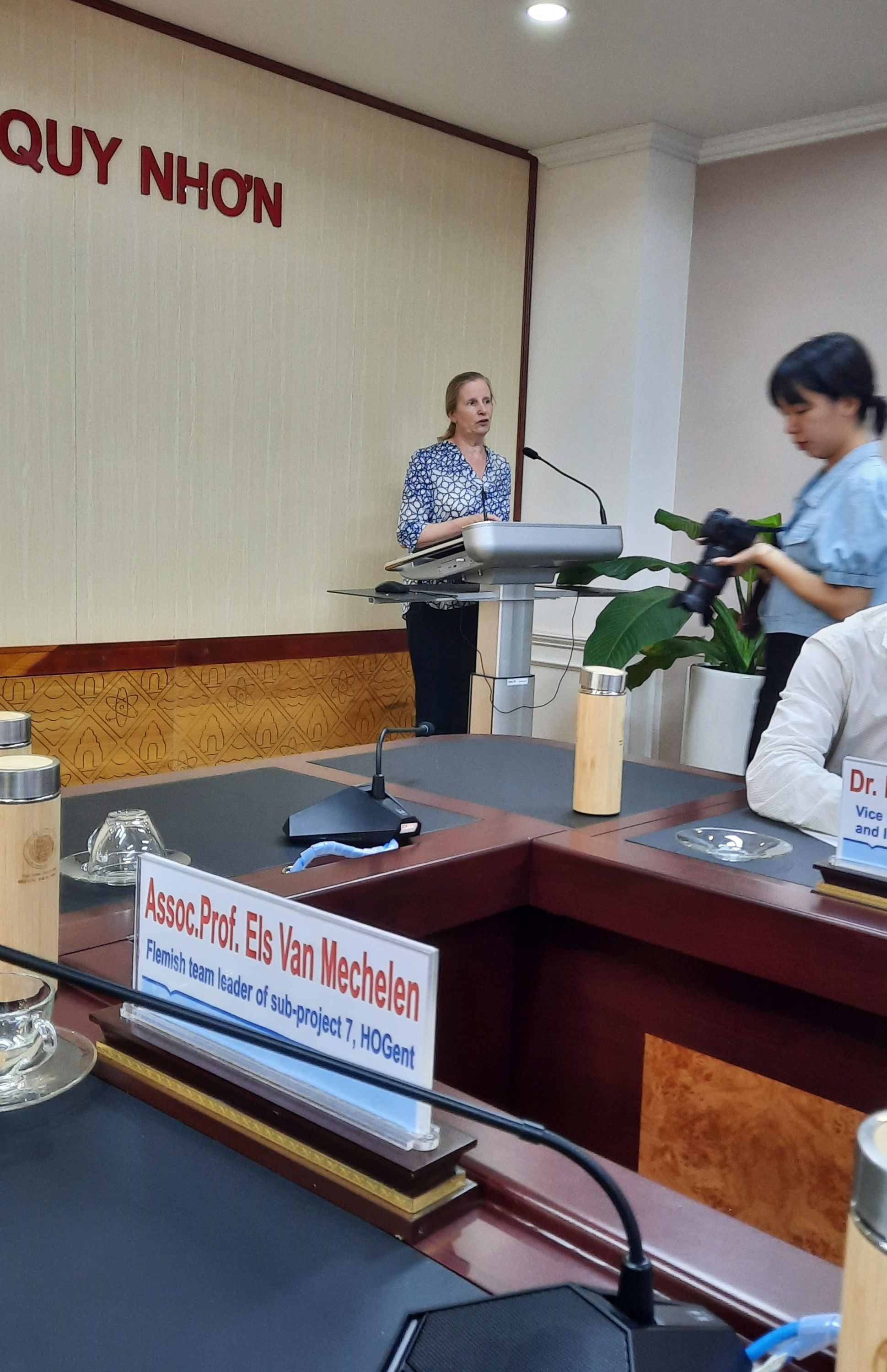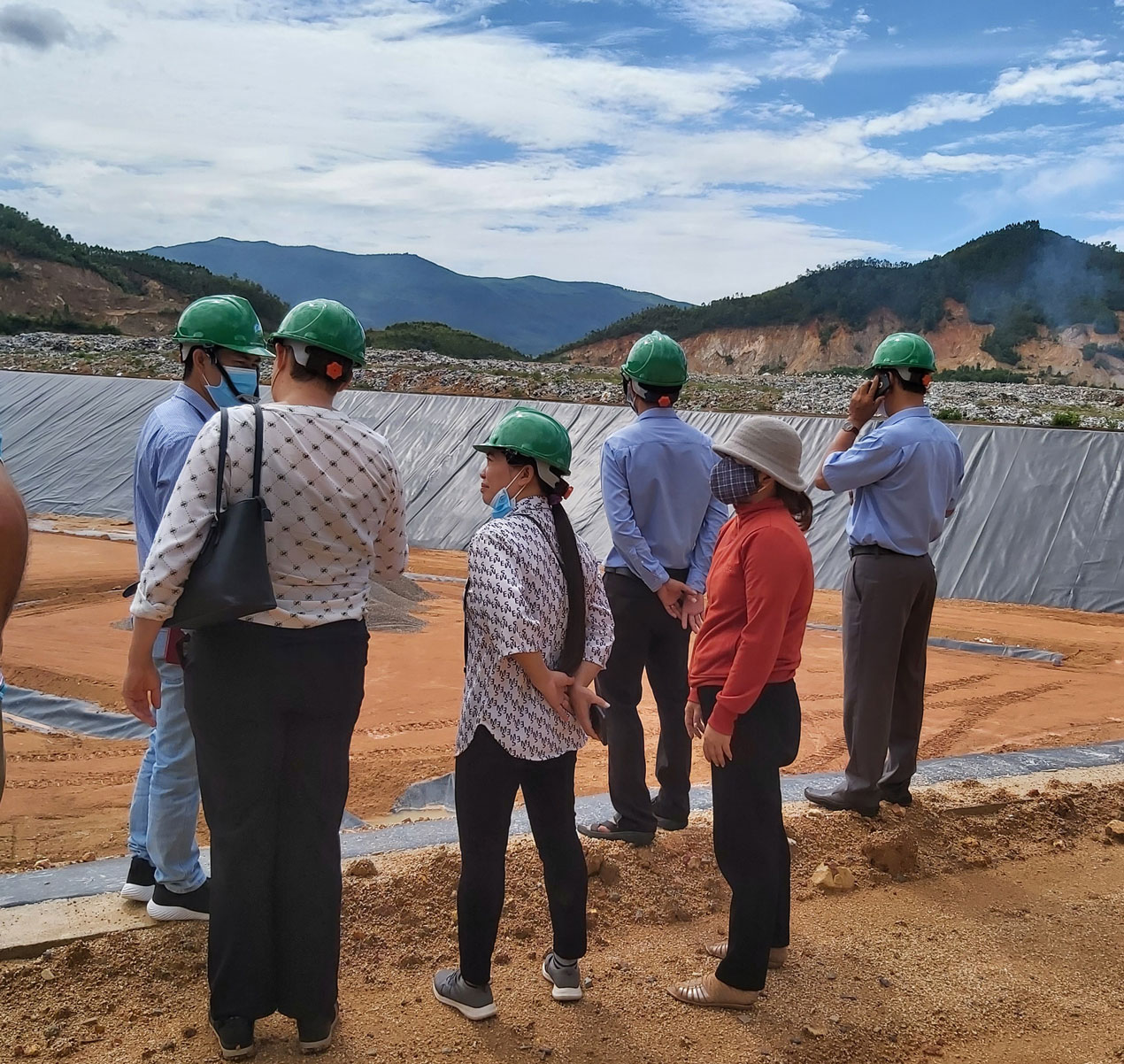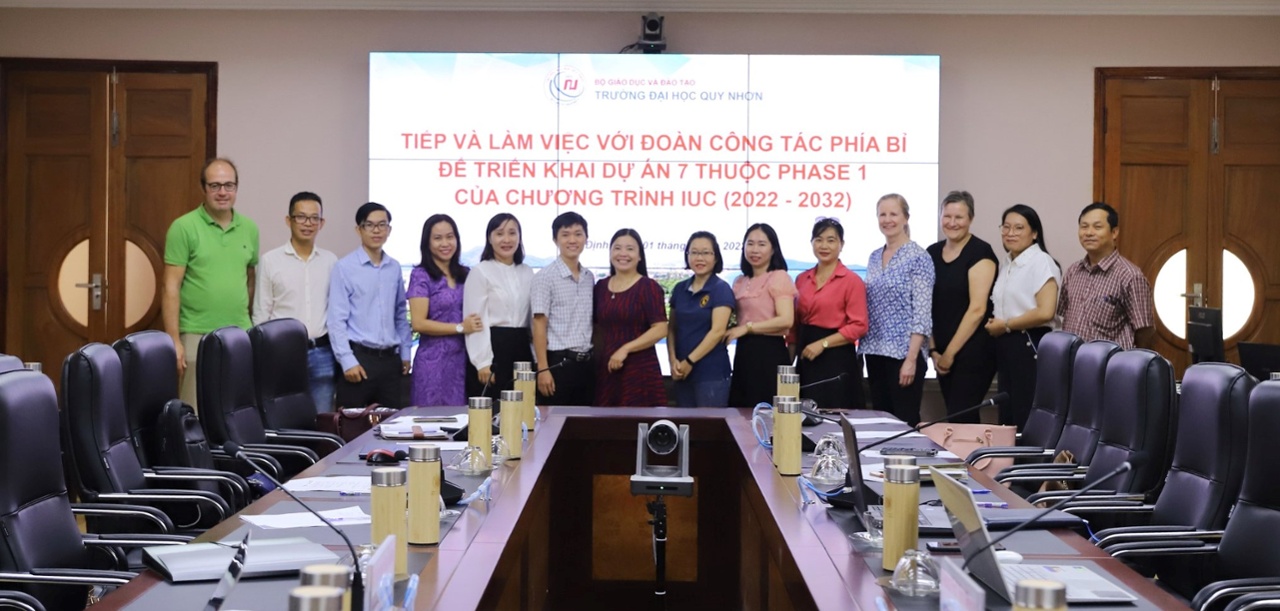HOGENT supports Vietnamese university in building safer, more sustainable labs and waste management.
HOGENT is working on a multi-year project with the Faculty of Natural Sciences at Quy Nhon University (QNU) in Vietnam. The focus is on improving lab safety and developing sustainable waste management practices on campus. The initiative brings together the Health and Water Technology research centre, the Prevention, Environment and Well-being service, and the Environmental and Sustainability Management degree programme.
Vietnam still has a long way to go when it comes to selective waste collection and proper lab practices. These are areas where Flanders has strong expertise, so it's no surprise that Quy Nhon University turned to HOGENT for support.
HOGENT is responsible for two project components, which form part of a broader VLIR-UIC programme involving several Flemish universities (see insert: 'Seven subprojects'). HOGENT is the only university of applied sciences participating.
"Vietnam, especially the southern region around Quy Nhon, can still be considered a developing area," says Els van Mechelen, research coordinator at Health and Water Technology. "There is real potential for improvement, and we're happy to contribute."
From 29 July to 10 August, Els travelled to Quy Nhon together with Yves Ronsse, prevention advisor and environmental coordinator at HOGENT, and professor Vera Meynen from the University of Antwerp, an expert in lab safety.
The visit aimed to assess the current state of the labs at QNU and gain insight into how the university manages waste on campus. Based on this, concrete plans are being drawn up for the first project year, which starts at the end of September. The team also visited two local waste processing companies (see insert: 'Waste management: still a long way to go').
"We received a very warm welcome. Communication wasn't always easy, but with goodwill and persistence on both sides, we addressed some sensitive topics. I believe we’ve laid the foundation for strong teamwork," says Els confidently.
Unsafe
QNU currently has 35 labs, half of them chemical and half biological. According to Yves Ronsse, there's still a lot of work to be done in terms of safety and biosafety. "Some workbenches are unsuitable, and safety storage cabinets are often missing. The labs don’t comply with GLP (good laboratory practice) standards. There’s no central record of who uses which products, in what quantities. This leads to inefficiency and creates unsafe, environmentally harmful conditions."
Improving this is one of HOGENT’s key tasks: helping QNU make its labs safer, more efficient, and sustainable. HOGENT will organise train-the-trainer sessions, and researchers from QNU will work temporarily in HOGENT labs to experience proper lab management. A custom course is also being developed for QNU students, with an exam attached. Only students who pass the exam will gain access to the labs. Students will also be asked to collect case studies of when things went wrong, ideally recording these on video. "By having students document and reflect on such cases, they’ll learn directly from them, and we can share these experiences," Els explains. "The long-term goal is for lab work at QNU to become just as safe, efficient and environmentally conscious as it is at HOGENT."
Complementary
The second part of the project focuses on sustainable waste management. Here, students from HOGENT’s Environmental and Sustainability Management programme are involved. "In the region around the university, there is currently no selective waste processing, not even on campus. As part of their internships and bachelor theses, three HOGENT students will spend twelve weeks in Vietnam”, explains Linde Raport, lecturer and internship coordinator.

Els Van Mechelen explains to her Vietnamese and international colleagues.
Seven sub-projects
The HOGENT project is one of the seven sub-projects of an umbrella VLIR IUC programme at the Faculty of Natural Sciences of Quy Nhon University (QNU). In addition to HOGENT, the universities UGent, KULeuven, University of Antwerp and UHasselt are also involved. Through this set of seven sub-projects, the Vietnamese university is to make progress in both research and practical applications in the areas of:
- Predicting natural disasters
- Storing fruit and vegetables
- E-learning and library management
- Good lab practices and waste management on campus
The subsidy for the HOGENT project amounts to 60,000 euros per year, a budget that goes entirely to QNU. In addition, the province of East Flanders granted a subsidy of 7000 euros.
General information about the project can be found in this youtube video (HOGENT is mentioned at 3’05’’).

Waste processing in Vietnam: still a long way to go
Els Van Mechelen and Yves Ronsse visited two waste processing plants in Vietnam. At the company pictured, waste is mainly dumped in a deep pit, which is therefore not really waste processing. However, a deep layer of plastic is provided at the bottom and there is also a system to ensure that water is drained, so that as few toxins as possible end up in the soil. The hope and intention is to install more modern waste treatment technologies in this plant in the future.
“A fourth student starts with a 4-week internship at the Department of Prevention, Environment and Welfare to apply his acquired knowledge about waste management in the labs of Quy Nhon University in the following 8 weeks.”
The students who were given the assignment underwent a selection procedure. There were seven students candidates for the internship assignment in Vietnam, so a choice had to be made. This consisted of a motivation letter and a group interview. The final selection took into account, among other things, complementarity: who already has foreign experience and who doesn't? Who has what prior knowledge? Who takes on which role in group work? Who has experience in project management?
“The students' assignment will be quite a challenge. Moreover, they live on each other's skin for several weeks, in an environment that is completely unfamiliar to them. Then it is extra important that they complement and reinforce each other," Linde adds. However, the students are not completely alone on site: there is cooperation with a number of local non-profit organisations and, of course, they also receive support from Linde as an internship supervisor.
Social impact
The students' work will initially consist of basic research: "They will map out the waste streams: what type of waste is there exactly and in what quantities? This will mainly concern plastic packaging, food and green waste and hazardous waste. On the basis of this, among other things, the students will make proposals that should lead to a campus policy on prevention, reuse and recycling. Their information is essential because we are building on it," Linde clarifies. After all, the intention is to organize the internships in the coming years as well. "Over the next five years, we want to focus on raising awareness, gaining insight into the impact of the campus on the environment and sharing knowledge," she says. "In this way, our students create a bit of social impact in Vietnam."
